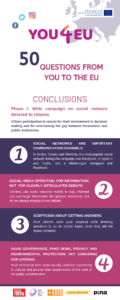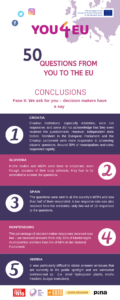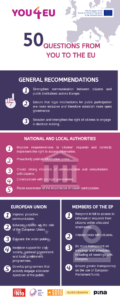Madrid, 22 May 2020 – Citizens across Europe need better access to information to participate in decision-making processes at European, national, and local level. This is one of the main findings by Access Info Europe and partners of the “YOU4EU” project, which has been completed following two years of research and campaigning on civic participation.
An extensive study carried out by Access Info (Spain), Belgrade Open School (Serbia), GONG (Croatia), Institute Alternative (Montenegro) and PiNA (Slovenia) also found that policy-makers are failing to communicate adequately with citizens, even though the public is keen to learn about their governments and institutions, and to engage in decision making.
The project partners mapped how the public seek information, especially via social media, and collected 367 questions from 288 citizens. These were grouped into 50 key questions on topics such as good governance, use of EU funds, personal data protection, environmental protection, media freedom, fake news, the European Parliament elections and the EU accession process, and resulted in the report “50 Questions from YOU to the EU”. ![]()
See the conclusions and recommendations outcome of this report by clicking on the images below
The organisations noted, however, how hard it is get answers from public authorities. They sent the questions previously collected to 647 decision-makers at EU, national and local level, but just 181 of them replied!
“This project helped us understand why citizens feel distant from governments,” said Helen Darbishire, Executive Director of Access Info. “In order to change this and restore citizens’ trust in the political system, public bodies need to improve proactive communication with citizens, and to commit to transparency both of decision making and the spending of funds.”
The main recommendations contained in the final project publication “YOU4EU Policy Recommendations”![]() include:
include:
- EU institutions should improve proactive communication with citizens; better inform citizens about what the European Union is, how it works, and what it actually does to benefit citizens; better inform the wider public about mechanisms for connecting with the EU and becoming involved in the activities of the various EU institutions, bodies and agencies. The EU should also establish minimum standards on the right to access to information for both EU and accession countries.
- MEPs should be more active in their personal interactions with citizens, respond to requests for information from citizens in a short period of time and in full, and be fully transparent about their meetings and schedules, including all meetings with lobbyists, and the use of funding received from the European Parliament.
- National governments should strengthen Information Commissioners and ensure that sanctions for non-compliance with national access to information laws are established. National governments should sufficiently train public officials, members of parliaments and judges to guarantee an effective exercise of the right of access to information.
- Civil society should train citizens on active participation and press governments to use and develop e-participation tools.
The project findings were discussed with civil society members and organisations at public events in Croatia, Montenegro, Serbia and Slovenia, about their information needs as well as about participation mechanisms. Overall, the YOU4EU – Citizen Participation 2.0 project involved 1,066 direct participants and reached approximately 556,000 people through social media, internet portals, newsletters, YouTube videos and promotional materials.
An overview of all the activities carried out is available this link.
For more information, please contact:
Paula Domínguez, Communications Officer | Access Info Europe
paula[at]access-info.org +34 637 22 66 09
Helen Darbishire, Executive Director | Access Info Europe
helen[at]access-info.org +34 637 226 609




